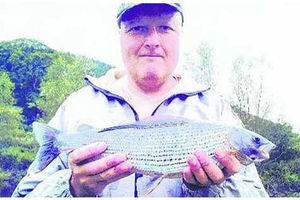Angler ate his record-breaking fish
A Staffordshire fisherman blew his chances of entering the record books - after eating his prize catch.

A Staffordshire fisherman blew his chances of entering the record books - after eating his prize catch.
Dave Williams caught the five-pound grayling while fishing in the River Severn near Newtown, Wales.
The 47-year-old warehouse worker wrestled with his catch for 15 minutes before he was able to haul it to the bank. However, the mammoth was deep-hooked and, despite Dave's best efforts, died in his hands, so could not be put back in the water.
Dave weighed his catch at home in Cannock with his wife Joanne and 10-year-old son James - before cooking it up for a meal the following day.
But then he received a call from a fishing friend to tell him his dinner had broken the British record by a massive 11oz. Despite photographic evidence and a sworn statement, the British Record Fish Committee have refused to award Dave the prize.
Bosses said he would have taken the record had he kept the catch in his freezer until they could verify it. He said: "I suppose it's a bit of a funny story, really. It was my second big catch of the day, but the first one snapped my line.
"'I've caught big fish before - a 20Ib pike from Chasewater reservoir - but this was a once-in-a- lifetime experience.
"As soon as I felt it, I knew there was something a bit special on the end of the line - and it really put up a fight. At the time I was just chuffed I had caught such a beautiful fish, but now it definitely hurts.
"I'm going back there and this time I won't eat the evidence."
Wife Joanne, 37, was also devastated for her husband - but admitted the catch had made a lovely dinner.
She said: "It was very nice, tasted a bit like chicken. We had it with chips. But we felt a bit sick when we got the news about it being a record-breaker, though.
Under Record Fish Committee rules, prize catches have to be verified by an independent witness and the scales they were weighed on have to be checked. The committee will also accept frozen specimens, a spokesman added.





